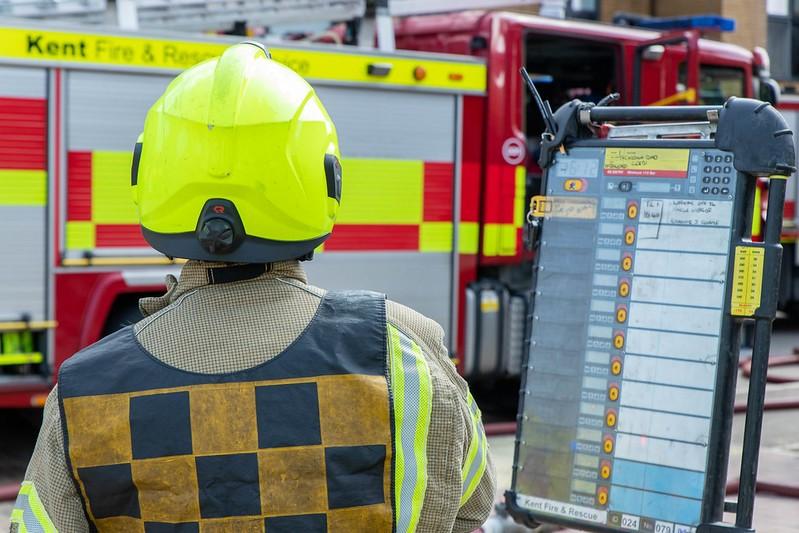
Support after an incident
If you are consulting this page, it is likely that you may have experienced or witnessed a fire or other emergency at your home.
We understand this can be a very difficult and stressful time and we're here to help.
Below, you'll find practical advice to help you to stay safe, look after your wellbeing and begin to recover, with details of the support available to help you through this challenging time.
Key contact details
Some key details and phone numbers that you might need
- Fire incident reference number - to be provided by firefighters
- British Red Cross - 0344 87 1111
- Kent County Council (KCC emergency number) - 03000 41 91 91
- NHS 111 (24-hour helpline for health advice) - 111
- Kent Police non-emergency - 101
- MIND support line - 0300 102 1234
- Kent Fire and Rescue Service - 01622 692 121
Actions and considerations during or immediately after the incident
Your health and safety
Experiencing a fire or other emergency can be traumatic and it’s important to prioritise both your physical and emotional wellbeing.
Physical health
- Make sure you and your loved ones stay a safe distance from the incident. Breathing in smoke can cause harm, even if you feel fine at first.
- If you have any health concerns, contact your GP or call the NHS 111 for advice.
- In an emergency, always dial 999
Emotional health
It’s normal to have emotional reactions after an incident. Smells, sounds and sights – such as smoke or sirens – can trigger difficult feelings. There is support available:
- For children, we recommend informing their school about the incident and ask about counselling support.
- NHS England provides information on common emotional responses, steps you can take, and useful resources.
- The Mental Health Foundation provides information about trauma, what to expect and where to seek help.
Retrieving valuables
- If you’re there while firefighters are in attendance, they may be able to retrieve some valuable from your home, such as important documents and medication. Ask the crew if this is possible.
- After the incident, it might not be safe for you to enter.
Securing the property
- Before leaving, make sure the property is secure by locking windows and doors. But only if crews have said it is safe to do so.
- If this isn’t possible, you’ll need to arrange help for this, such as a reputable emergency boarding up company.
- Make sure to contact Kent Police by calling 101 to make sure they know your property is empty.
Alternative accommodation
If it's unsafe to stay in your home:
- Check if your insurance policy covers alternative accommodation.
- Consider asking friends or family for help.
- If neither of these options are possible, your local council’s housing office may be able to offer emergency accommodation.
- The British Red Cross offers excellent crisis assistance.
Accessing essentials
You may need to urgently replace essentials such as clothes, school uniforms, toiletries and food. You could consider:
- Asking family or friends for short-term support.
- contacting The British Red Cross for support and advice.
- Reaching out to your local council to see what immediate hardship support is available.
Actions to consider following the incident
Insurance
If you have insurance cover
Contact your company as soon as possible and tell them you need emergency support. Many have 24-hour emergency help lines.
If you rent your property
Contact your landlord immediately to tell them about the incident.
The following advice may help you:
- Check your policy details in relation to the loss/incident suffered and ask for a claim form.
- Take photos and write a list of any damaged property or goods when it’s safe to do so
- The insurance company may want to inspect the property/contents before you begin clearing up.
- Get written quotes for any building works and redecoration (normally three are needed) and include these with your claim form.
- Going forward, keep receipts for all work undertaken, as they may be needed for a claim.
- If you have limited access or knowledge about technology, consider asking a friend or family member to support with using a computer and completing online forms.
Replacing any lost documents
If important documents were damaged or lost in the fire, here’s how to replace them:
- Insurance - contact your insurance company who will issue new documents.
- Banking - contact your bank or building society about replacements of any documents or cards needed.
- Passports, driving licence and birth certificates - visit GOV.UK for advice about replacing these
- Medical - contact your doctor or the local hospital about any medical records or prescription needs.
Traumatic events
Whether you are directly involved in, or witness a traumatic event - from a fire in the home to car crashes - everyone feels and reacts differently
If you, or someone you care about, has experienced a traumatic incident, it's important to know how and when to seek help. The help needed may range from practical assistance such as help with finding emergency temporary accommodation, to advice on coping with the emotional effects of what has happened.
Looking after your own wellbeing and that of those you care about is important. Below you will find further details about the different types of help and advice available.
Talking to someone

Sometimes people need to talk to a professional about what has happened. Your GP may be able to recommend someone accredited near you or you can find counsellors listed by area on the Counselling Directory.
Kent County Council's Release the Pressure counselling service
Kent County Council - Release the Pressure for free confidential support 24/7 from trained counsellors on 0800 107 0160 or text the word Kent to 85258.
Samaritans
The Samaritans are available to help anyone going through any sort of crisis or difficulty 24 hours a day, 365 days a year by phone, email and letter. Calls to the Samaritans are free on 116 123.
Their website also provides information about what they do, and what you can do to help yourself or someone you are supporting.
Brake
Brake is a charity dedicated to those who have been bereaved or seriously injured in a road crash, and those supporting them. The assistance they provide ranges from legal support to providing a named caseworker to assist with a variety of issues.
Their confidential National Road Victim Service Helpline on 0808 8000 401 is open Monday to Friday from 10am to 4pm or you can email [email protected]
Support following suicide
Amparo
Amparo is part of the 'Listening ear' charity and provides free, confidential emotional and practical support for those affected by suicide. Learn more on their website or call them on 0330 088 9255.
Suicide Bereavement UK
Suicide Bereavement UK provide a helpful chart to assist with notifying agencies and organisation when someone has died.
Victim Support
Victim Support is an independent charity dedicated to supporting victims of crime and traumatic incidents in England and Wales.
Further assistance
If you have any questions, you can contact our dedicated customer support team on 01622 692 121, between 9am and 5pm, Monday to Thursday and between 9am and 4.30pm on Friday, or by email to: [email protected]
If you are deaf or hard of hearing, you can contact us via Relay UK: 18001 01622 692 121. Relay UK is a free service to help deaf people and those who have hearing loss or are speech impaired to communicate over the phone.
In the case of an emergency please dial 999 and ask for the fire and rescue service.
Tell us about your experience
If you have recently experienced a fire or other emergency that we attended, please tell us about it. Your input will help us to constantly improve and help others who find themselves in the same situation.
